BATTLE FOR FUNDS
Western Cape women’s shelters face permanent closure unless they receive financial aid
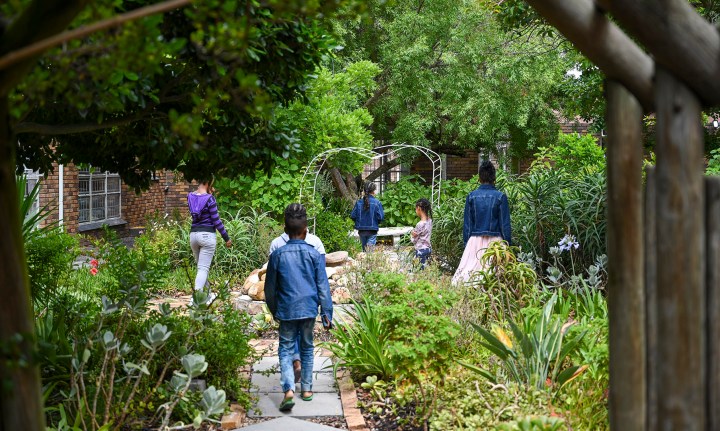
The Western Cape Women’s Shelter Movement), which campaigns for survivors of gender-based violence, has made an urgent call for assistance as 14 of their 26 shelters are in danger of closing due to lack of funding.
Shelters cannot raise sufficient funds to cover the deficit in their budgets after the allocation of funding from the Department of Social Development (DSD), said Delene Roberts, Western Cape Women’s Shelter Movement (WSM) chairperson and director of Sisters Incorporated. The situation is exacerbated by the escalating economic crisis and rising costs of basic needs.
The WSM shelters offer services ranging from short and long-term shelter stays, legal support, and psychosocial and economic empowerment services to women and children who are survivors of gender-based violence
Imminent danger
Some shelters are facing imminent closure, while others have funds for two to three months. One shelter facing immediate closure is The Safe House, located in the southern suburbs of Cape Town.
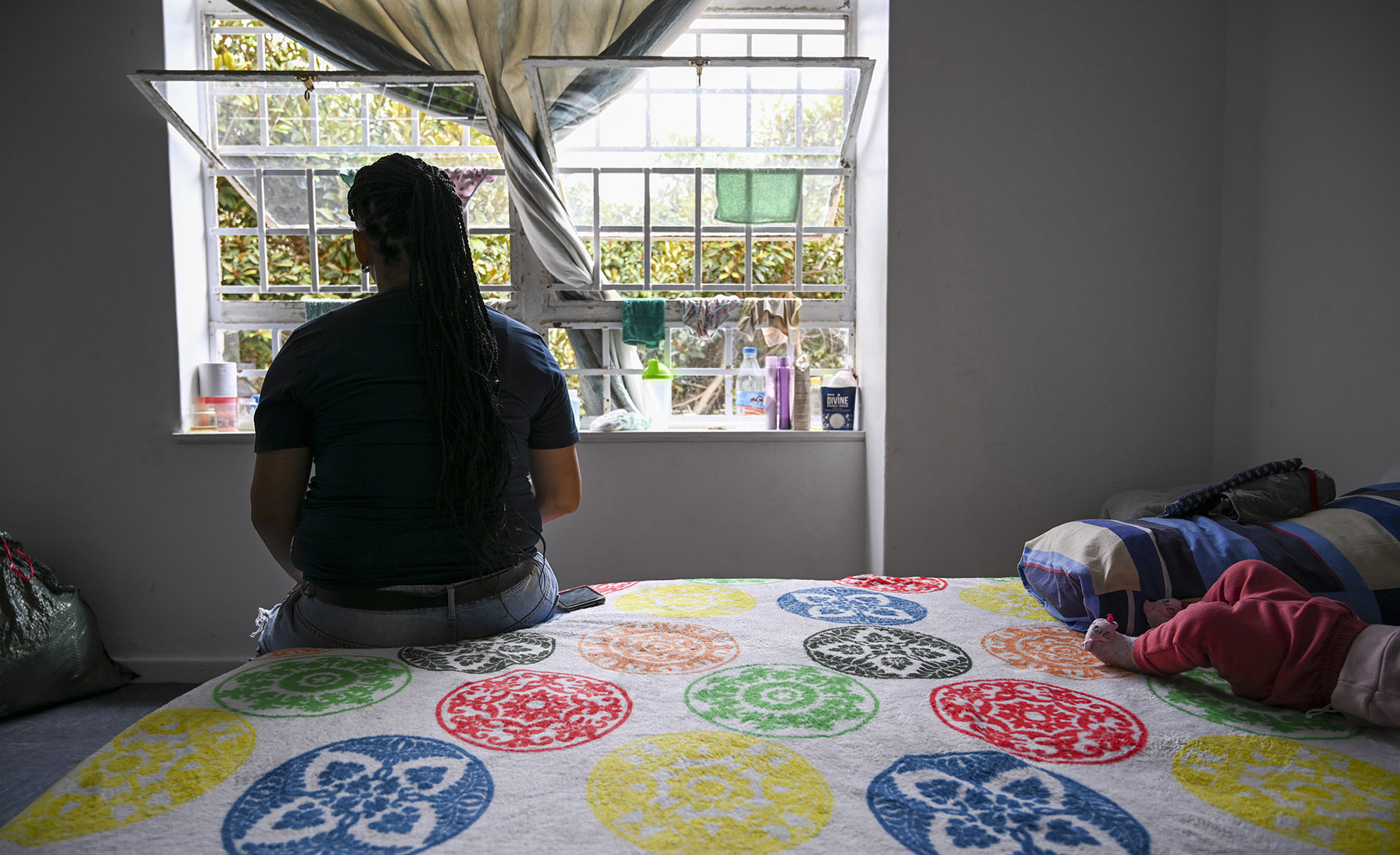
‘Jay’ (not her real name) sits in a room where she has stayed for three months with her young children at the Saartjie Baartman Centre in Manenberg, Cape Town. The centre offers shelter, counselling, therapy, training and support for women and children who are survivors of abuse. (Photo: David Harrison)
Kathy Cronje, the vice-chair of the Western Cape WSM and director of The Safe House, explained that the situation is critical.
“To put it simply, many of us will not be able to continue offering services very shortly if we do not receive emergency funds.”
The Safe House is likely to run out of funds by the end of December. While The Safe House usually accommodates up to 15 individuals for about three or four months, there are exceptions, such as a matric student who needs to finish their academic year. “That is when the board starts paying for the people in the house,” Cronje explained.
She said the shelter runs at a deficit of R1.2-million per year.
“To get us to the end of the financial year, which is the end of March, we need R490,000,” she said.
The shelter receives roughly 40% of its funding from the DSD.
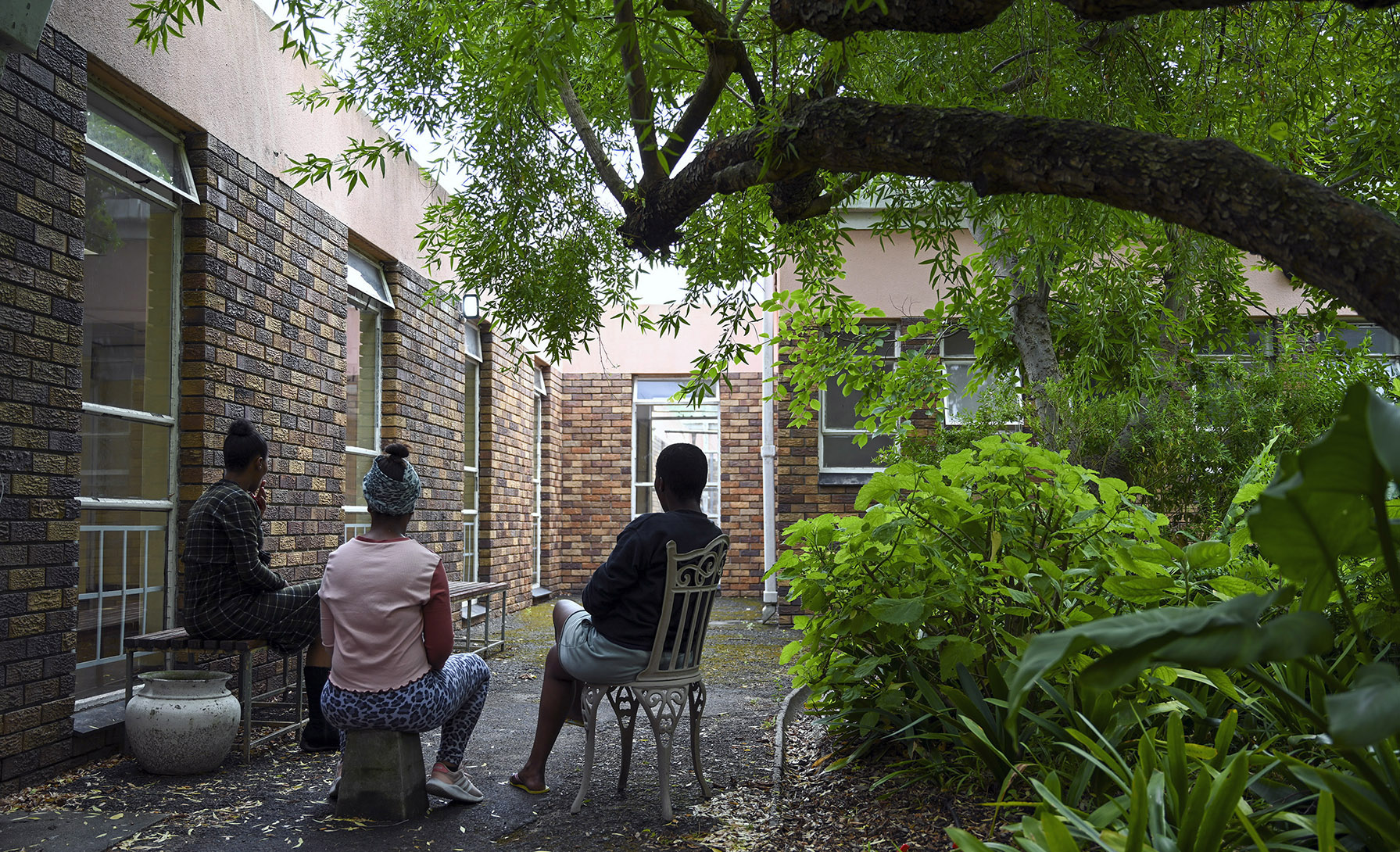
Several residents take a break in the ‘Serenity’ garden at the Saartjie Baartman Centre in Manenberg, Cape Town. (Photo: David Harrison)
“We have received the same amount for the last three years, so salaries haven’t gone up, managers are still not paid by the government, and a few of the posts are not paid by the government,” she explained. The government only subsidises the social worker, the social auxiliary worker and the house mother.
The 11 staff at The Safe House have told Cronje that they would keep working even without a salary. Cronje herself has not received a salary in the past few months, because: “We just have not been able to afford it.”
Although the shelter will receive money from the DSD in mid-January, there are outstanding debts that will be settled with that money.
“It is things like our fuel account, which is two months in arrears; that is why this is so critical,” she said.
Cronje has called on the private sector to step up and assist where it can.
“So many people have offered to donate little things and they are all really appreciated, but we are calling on the private sector to help us with operational funding because that is what we are really battling with.”
A century-old centre in crisis
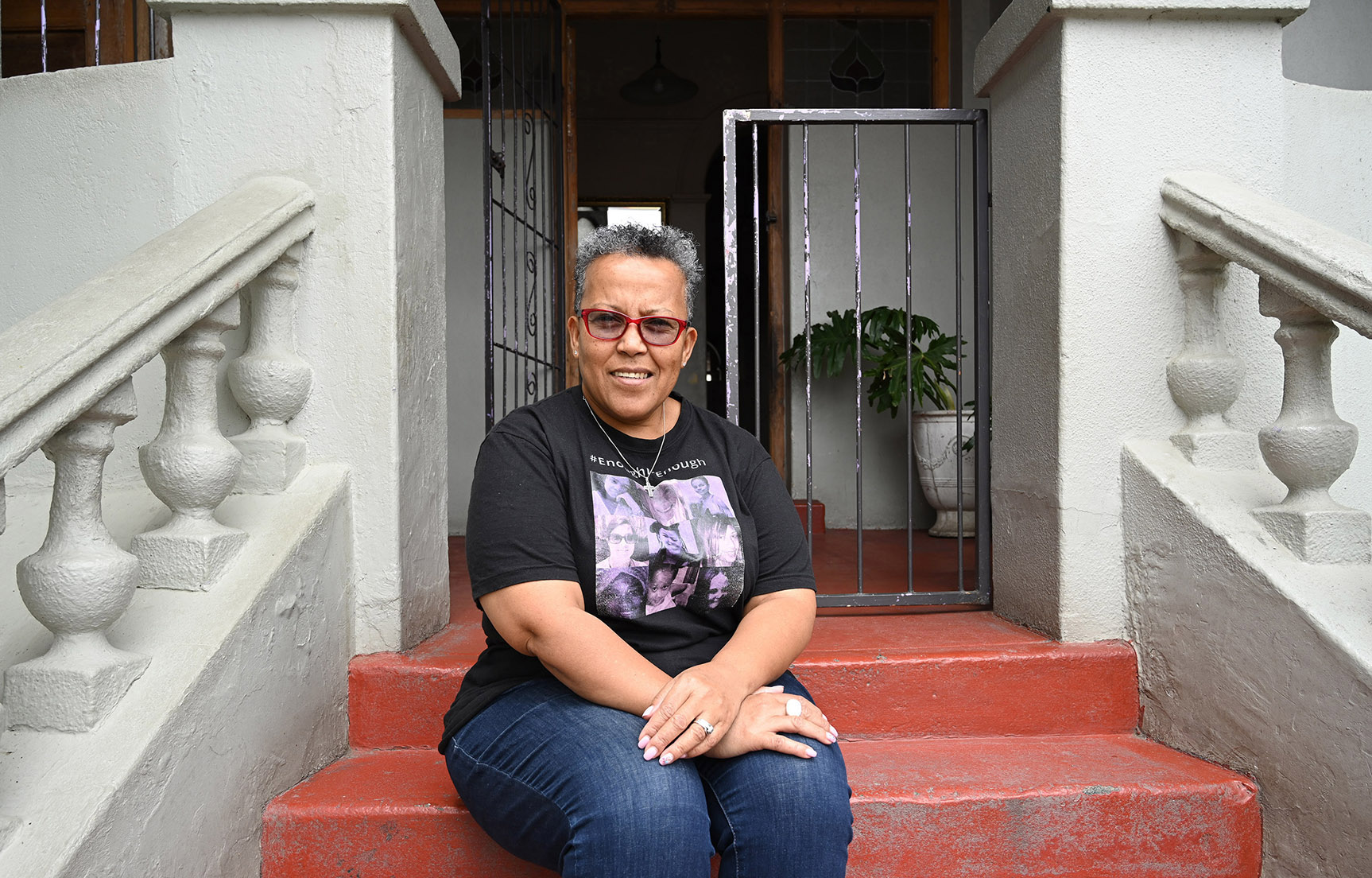
‘Gender-based violence is real,’ says Joy Lange, director of St Anne’s Homes for 13 years, outside the shelter in Woodstock Cape Town on Wednesday 30 November 2022. (Photo: David Harrison)
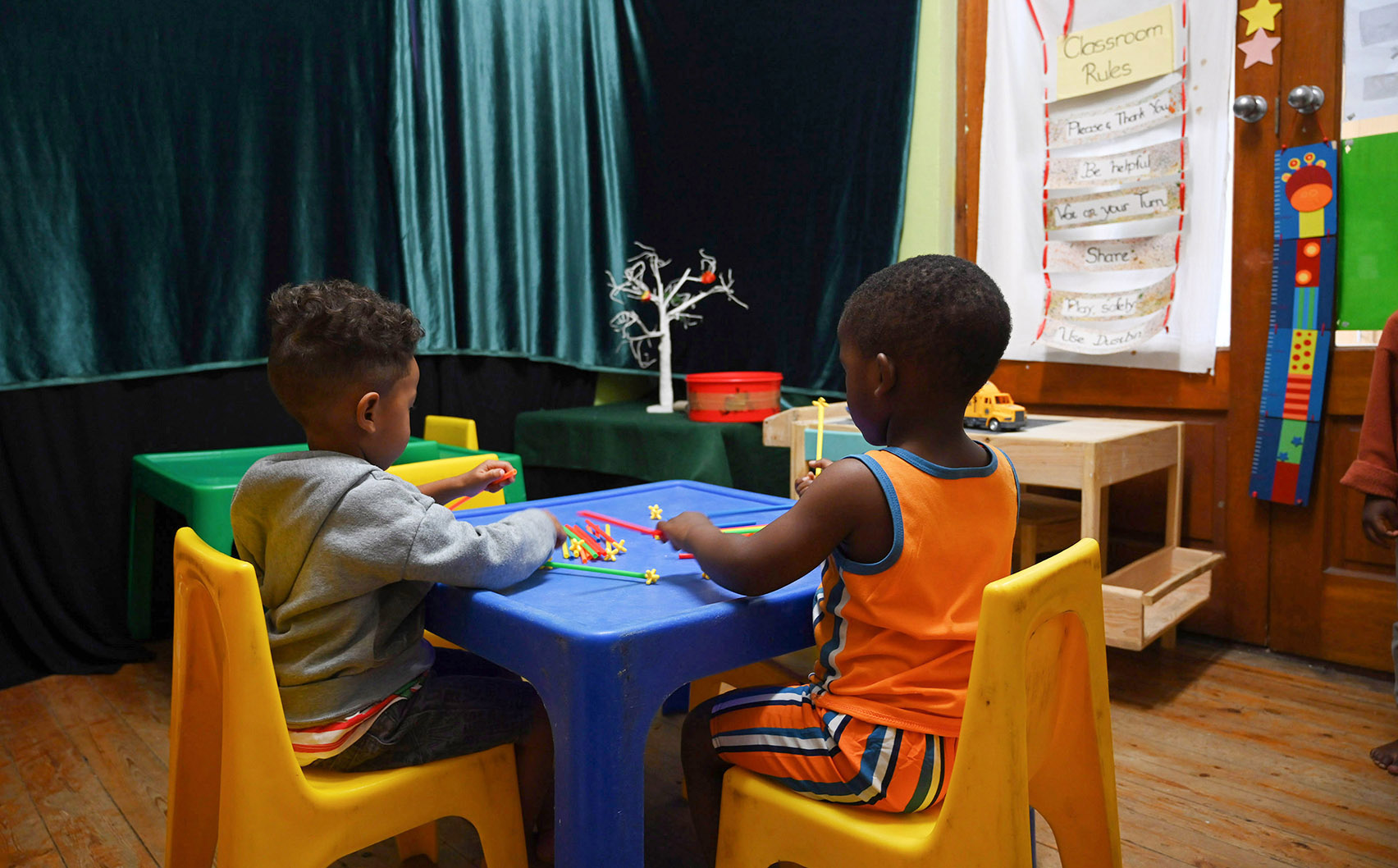
Two young children in the creche at the St Anne’s Homes shelter in Woodstock, Cape Town on Wednesday 30 November 2022. St Anne’s Homes offers services to abused, destitute and pregnant mothers and their young children throughout South Africa. (Photo: David Harrison)
Most of the shelters that form part of the Western Cape WSM receive their funding from the DSD, said Joy Lange, director of St. Anne’s Homes in Woodstock, Cape Town, which also faces closure.
“Sadly, for the past three years, government has not given shelters an increase and this has exacerbated the issue, which is why shelters are sitting in this critical situation,” she said.
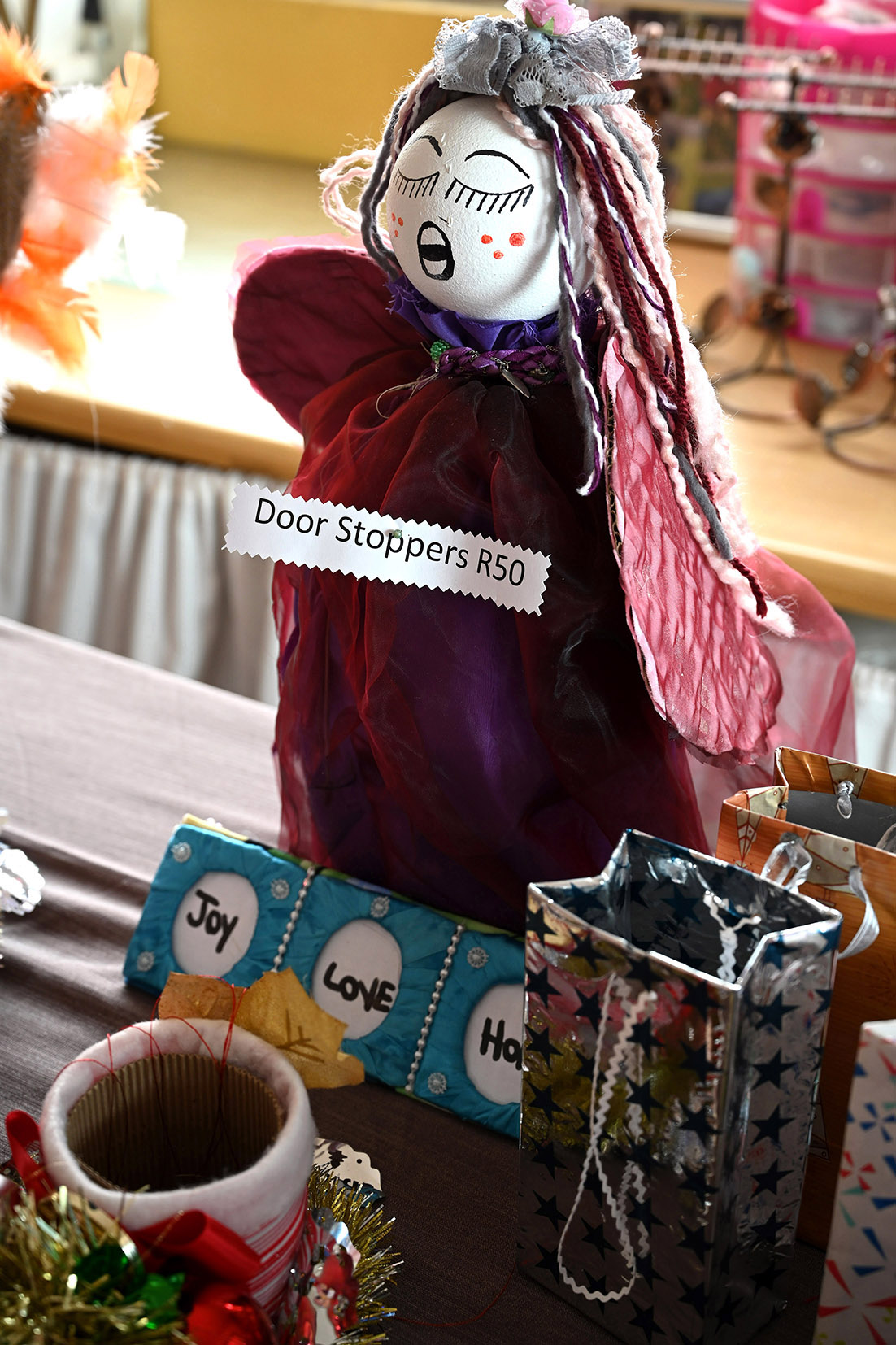
Some Christmas-themed gifts on a display in the charity shop at the St Anne’s Homes and Shelter in Woodstock, Cape Town on Wednesday, 30 November 2022. The shelter relies donations and sales from arts and crafts made by residents. (Photo: David Harrison)
The DSD covers less than 30% of St Annes Homes’ annual budget, while the rest of the funding is from corporates and individual donors.
“We can all feel the pinch of the economic downturn and it has resulted in donors abroad going from donating R200,000 per annum, to only R80,000 or even R60,000,” she said.
The money from the DSD is paid quarterly, meaning St Anne’s Homes will only receive the funds in January 2023. The shelter has 21 beds and needs R300,000 per month to keep operating.
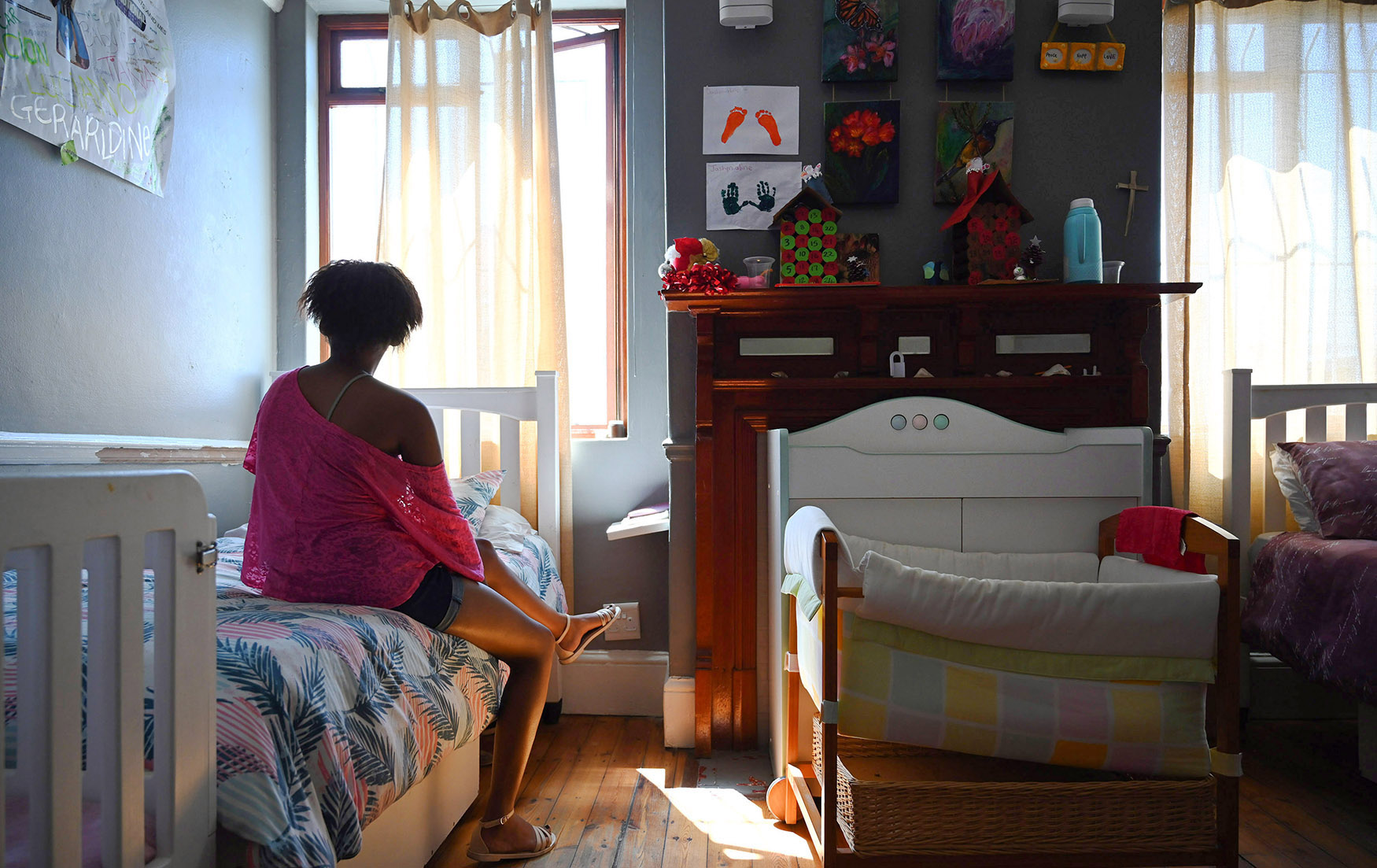
‘Tatiana’ (not her real name) in her room at the St Anne’s Homes and Shelter in Woodstock, Cape Town. St Anne’s Homes offer its services to abused, destitute and pregnant mothers and their young children throughout South Africa. (Photo: David Harrison)
“If 2,000 people each donated R50 a month, that would keep us going,” said Lange.
To donate to St Anne’s, click here.
Closures in Cape Flats
The Saartjie Baartman Centre for Women and Children in Manenberg is another shelter at risk of closing its doors, says advocate Bernadine Bachar, the director of the centre. The centre, which has 41 staff members, helps 40 to 50 women each week.
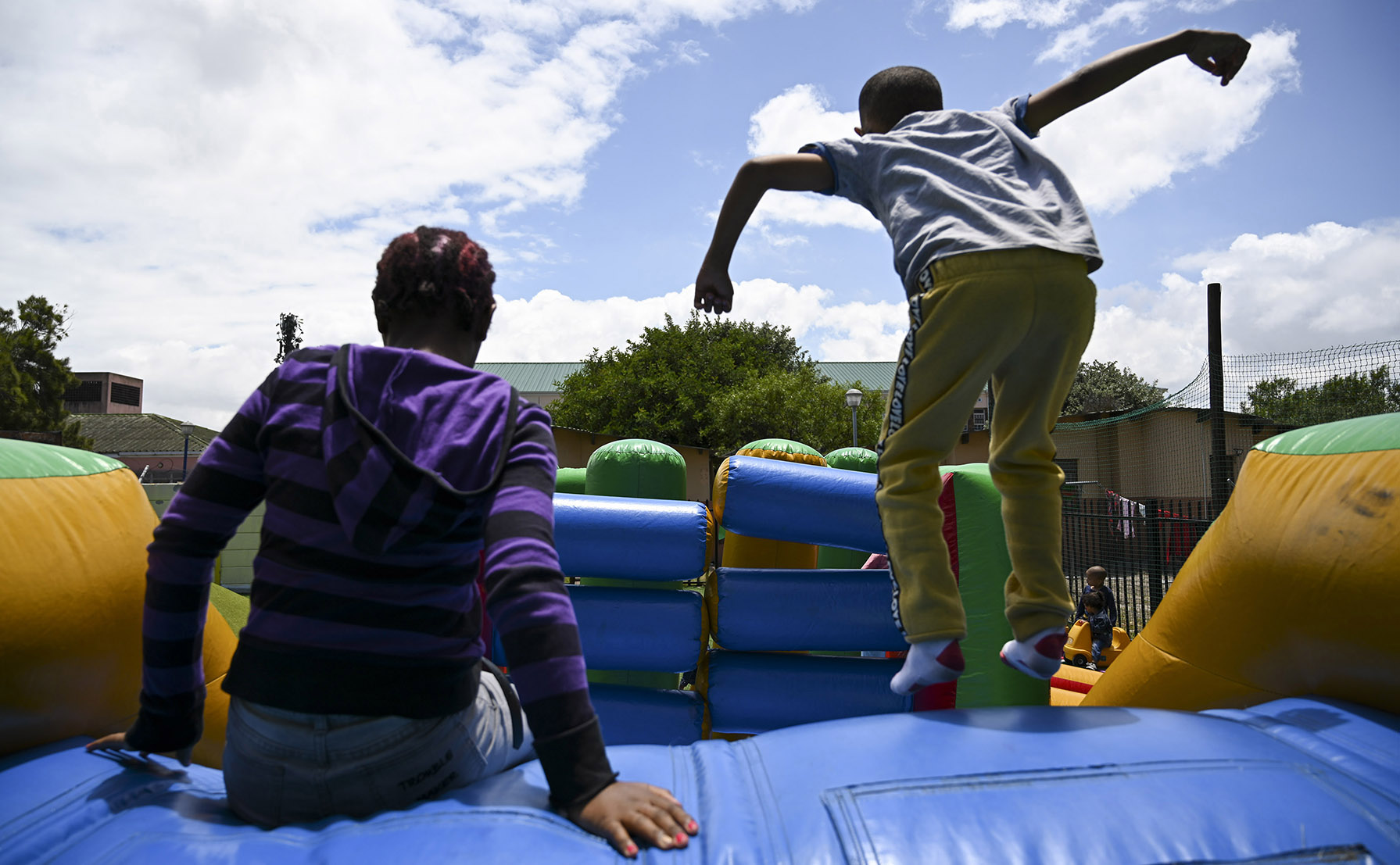
Children play on a jumping castle at the Saartjie Baartman Centre in Manenberg, Cape Town during an end-of-year party funded by donors the Kolisi Foundation and Total Energies, on Tuesday 13 December 2022. (Photo: David Harrison)
It offers an additional 120 women and their children accommodation for four months. Located in an area associated with high poverty levels, crime and substance abuse, the shelter is one of the largest in South Africa.
“Every month, I have a deficit of R500,000, so the deficit is R6-million a year to keep the doors open,” Bachar said.
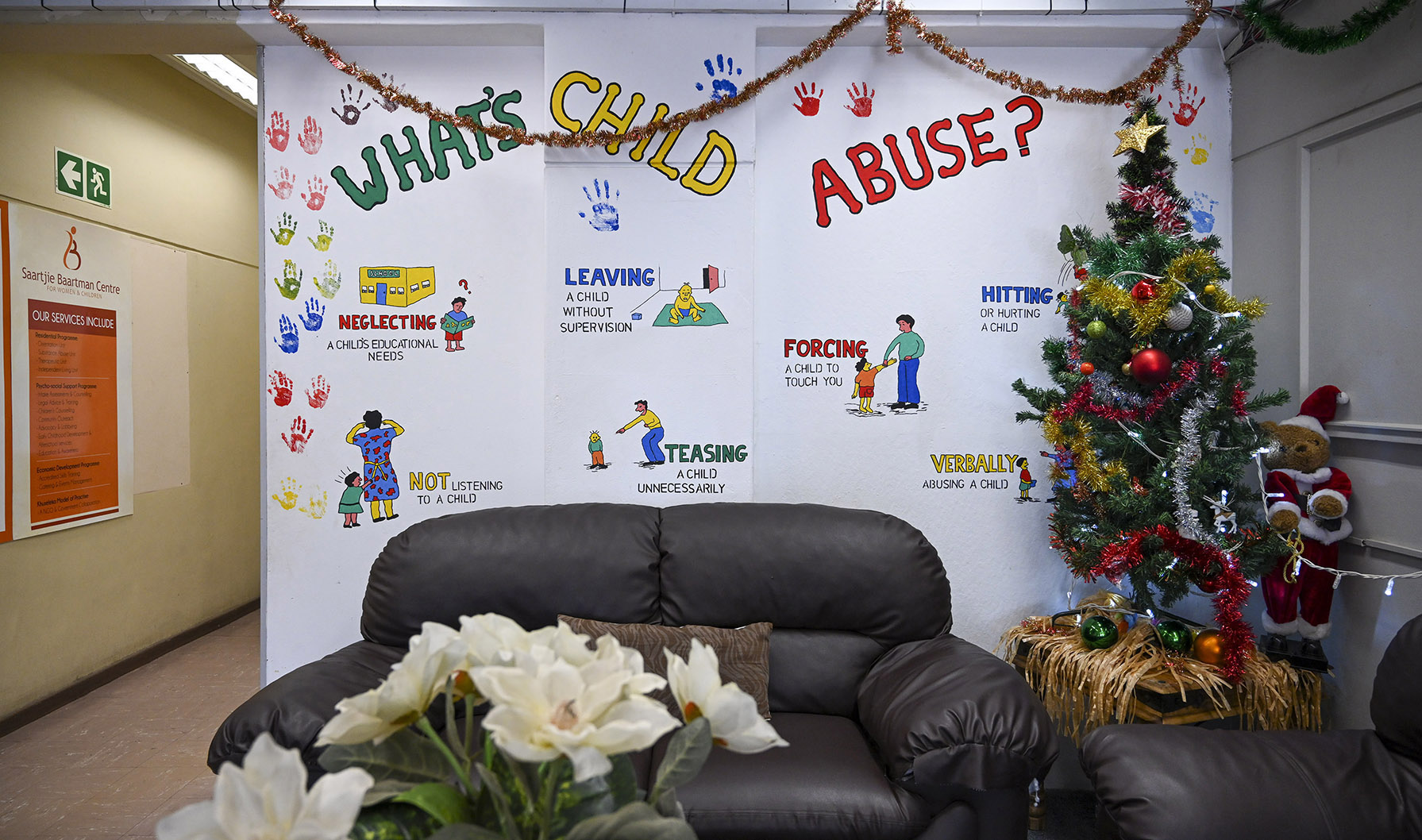
A painted message on the wall in the entrance area of the Saartjie Baartman Centre. (Photo: David Harrison)
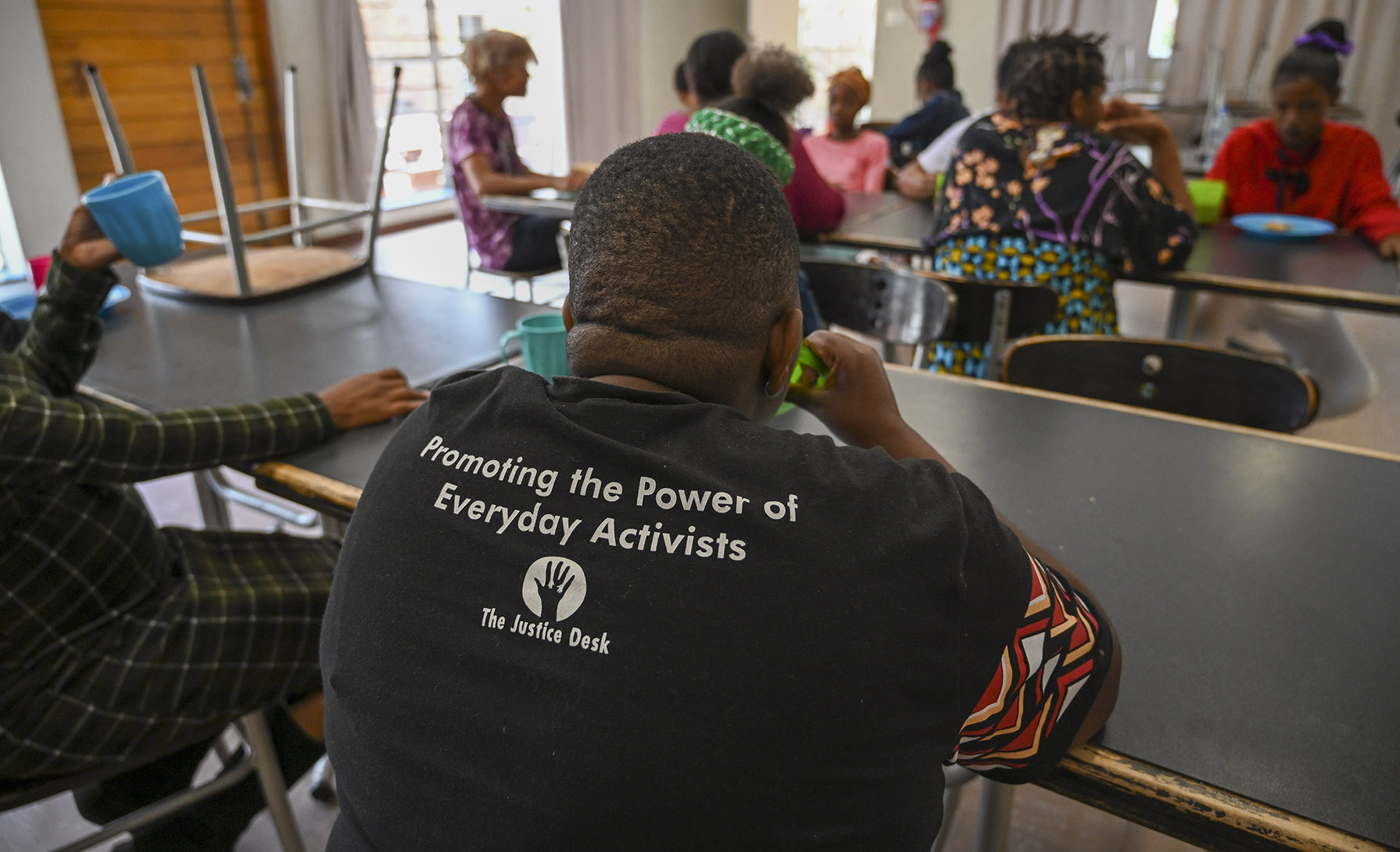
Residents have a mid-morning tea and sandwich break in the dining area at the Saartjie Baartman Centre. (Photo: David Harrison)
The centre, which opened its doors in 1999 and currently houses 120 women, receives about 30% of its funding from the DSD, while the rest is from donors. However, funders themselves are facing tough economic conditions, resulting in significantly fewer donations.
“We are at a crossroads, and the situation is dire. We see the numbers of GBV survivors increasing daily, yet the government is not able to bridge our 71% gap,” Bachar said.
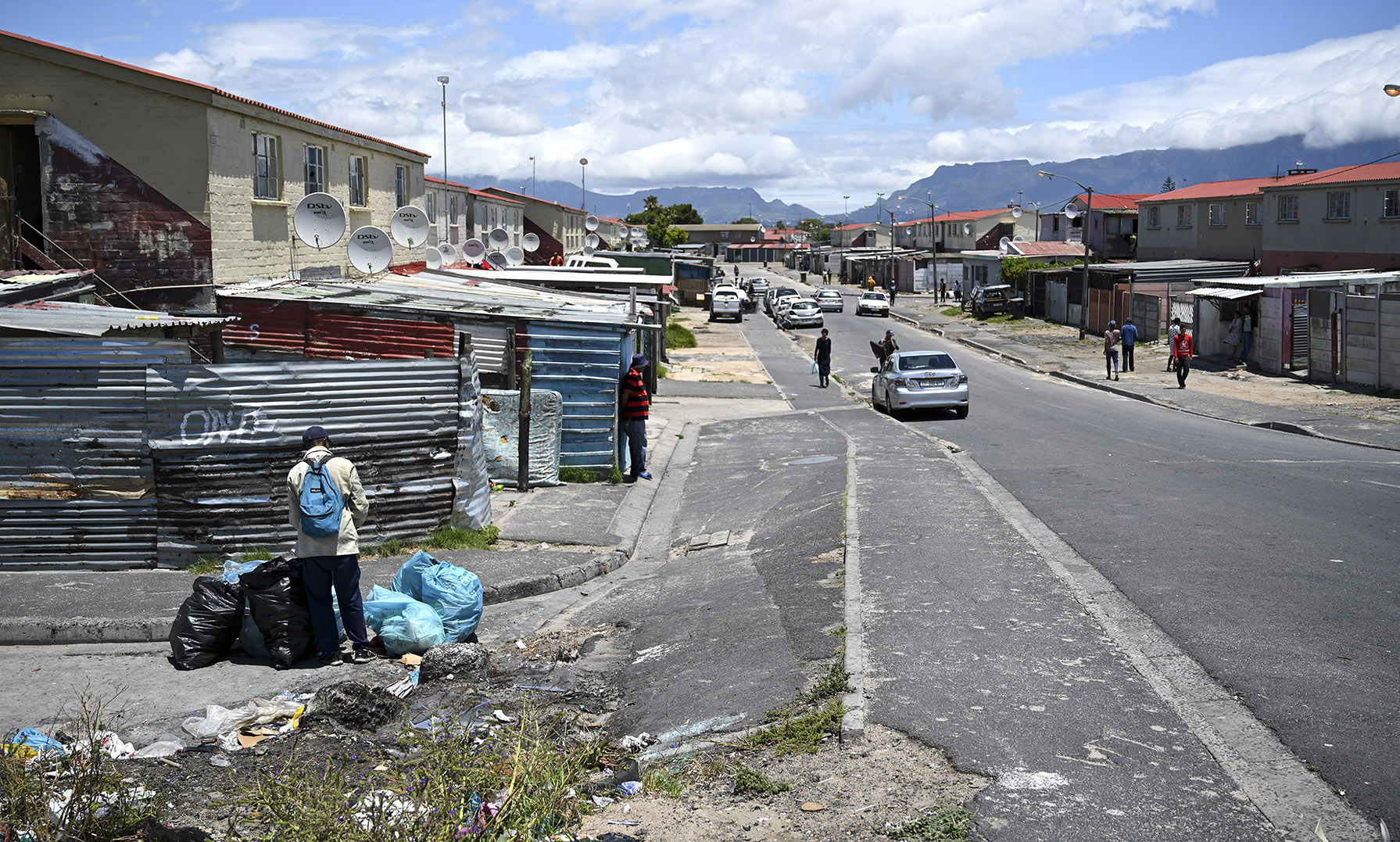
A street scene in Manenberg, Cape Town, a community near the Saartjie Baartman Centre for abused women and children. (Photo: David Harrison)
“The answer lies in the private sector, and we ask them to stand with us and allow us to continue to render services to survivors holistically.”
To donate to the Saartjie Baartman Centre for Women and Children, click here.
No funding for LGBTQIA+ and male survivors
Lucinda Evans, the director of Philisa Abafazi Bethu, runs an intervention safe house for LGBTQIA+ individuals and another intervention safe house for heterosexual male abuse survivors.
“I receive zero funding, I am not funded anywhere at all,” she says. To run the intervention safe houses, Evans utilises funds from her children’s programme.
“I should be able to accommodate clients for 14 days, but I cannot, I can only accommodate them for seven days because there is zero funding,” she said.
To run the safe houses as fully as her heterosexual shelter, Evans said she would need R750,000. This will also cover needs like counselling, dentistry and transport.
“We are an emergency service… we are open 24 hours, seven days a week, 365 days a year,” Evans said.
Visit Daily Maverick’s home page for more news, analysis and investigations
The shelter is the first line of service for survivors before they are referred to a long-term shelter. The money that the shelter currently receives from the DSD covers the basics, but much more is needed.
“The money does not cover follow-up medical expenses, specialised medicine that clients need, psychiatry and psychology services. (The yearly deficit for the shelter is roughly R100,000.) We piggyback on other programmes we run from our operations office to fund the shelter.”
Should any of the long-term shelters close their doors, Philisa Abafazi Bethu has pledged to step in and house the clients, Evans said.
“Monetary donations will go a long way, but so will perishable and non-perishable food items, toiletries, baby formula, new baby bottles and previously loved baby items such as blankets and crawlers.”
Click here for more details on how to donate.
Items can be dropped off at 55 Strauss Road in Steenberg or at Philisa Abafazi Bethu Shelter at 20 Sullivan Road in Retreat.
A word from the government
All funding is applied according to the prescripts of the Public Finance Management Act, as well as the Western Cape DSD Funding Policy, said Esther Lewis, head of communications at the DSD in the Western Cape.
All funded NGOs enter into a transfer payment agreement with the department, where the terms of the funding are detailed. The department monitors minimum service delivery standards at each shelter.
“A challenge raised by the sector at both the provincial and Presidential GBVF Summit is that there is no standardised national funding model,” Lewis said.
The Victim Empowerment Programme (VEP) of the DSD currently funds 26 shelters in the Western Cape. This breaks down to a total of 49 emergency beds (accommodation for up to 14 days), 400 Stage 1 beds (accommodation for up to three months), and 64 Stage 2 beds (accommodation for up to one year).
“More than R34-million was transferred to shelters during the last financial year,” said Lewis.
The VEP transfer budget for the 2022/2023 financial year was R62,866,000, of which 52% was spent on shelter services, she added.
Despite concerns raised by numerous directors about a lack of funding increases over the past few years, Lewis said that the funding model for the shelters had improved significantly over the past five years.
“The unit cost [per bed per month] has increased by 42%. The funding model of the VEP shelters consists of a unit cost per bed in the shelter, post-funding for a social worker to ensure that services rendered are in line with minimum standards, and a further contribution towards the salary of three house mothers per shelter, contribution towards health, safety and security and also a contribution towards skills development of shelter residents.”
The department is facing financial constraints, said Lewis, who echoed the calls of the directors for the private sector to get involved and empower women and children in the shelters.
What next?
“If… all of these shelters close, we will take away 310 beds from gender-based violence and femicide survivors and we will not be supporting 159 staff workers who support their entire families,” said Cronje.
Bachar explained that the closure of the shelters would be the worst-case scenario.
“It is something we are really fighting desperately against because nobody wants to close their doors,” she said.
Shelters are reaching a point where they cannot take in new clients.
“We will start moving clients around from one shelter to another shelter that is able to sustain themselves, so if The Safe Haven closes, we would spread those women and children amongst other shelters in the WSM,” said Lange.
Roberts stressed the issue of funding is critical and that shelters need help from the private sector.
“We urgently need the private sector to support the fight against gender-based violence, shelters cannot do this alone.” DM/MC
Donate to Sisters Incorporated on GivenGain





















 Become an Insider
Become an Insider
Comments - Please login in order to comment.